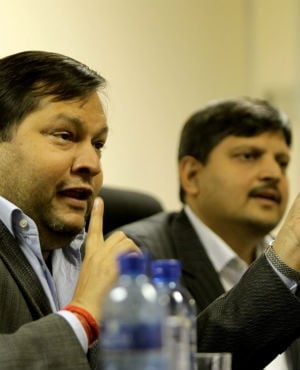
On 23 October 2015 the then president’s son Duduzane Zuma drove deputy minister of finance Mcebisi Jonas to the Gupta dons’ compound in Saxonwold, Johannesburg. (Read Jonas’ affidavit here in full.)
Under oath, Jonas testified at the Zondo Commission of Inquiry on Friday that the Guptas offered him R600m on the spot if he could ensure that National Treasury wouldn’t act as such a party pooper and that the Gupta clan aim to rake in R8bn from the state. (The Guptas and Duduzane Zuma have so far continuously shied away from providing any kind of version under oath.) The Guptas’ criminality and money laundering activities have by now been well documented.
But to illegally move around 10 figure sums is quite an achievement and requires an army of foot soldiers to pull off successfully. Banks adhere – supposedly – to strict local and international rules. These rules include suspicious transaction reports and threshold reports that banks by law are required to file with the Financial Intelligence Centre (FIC) and the Hawks.
How the Guptas received their billions and moved it around, especially after they became unbankable, has mostly been a mystery. An extensive investigation by Scorpio and News24 into SARS and the Guptas’ VAT debacle pointed directly to the abuse of Bank of Baroda, SARS, third party pay agents and shelf companies to artfully dodge financial regulators.
In roughly five years the FIC red-flagged at least R13.15bn in suspicious reports linked to the Guptas’ bank accounts. When the banks turned their backs on the Guptas, it was Tom Moyane’s SARS that galloped to the rescue.
* * *
The Hawks have a designated office to which suspicious transaction reports and threshold reports must be filed. According to insiders in two of the big banks of South Africa, the Hawks have never reacted to any of these suspicious transaction reports or threshold reports filed by the bank with the unit’s offices.
"There were days when we filed multiple suspicious reports linked to the Gupta accounts. The Hawks have not once come back to us to request more information," one of the insiders told Scorpio.
Our information slots in with Jonas’ testimony under oath about how major general Zinhle Mnonopi – Hawks head of serious corruption – wanted to "kill" the case laid against the Guptas based on his experience. Mnonopi wanted Mcebisi to sign a pre-drafted, false statement designed to aid in killing the case against the Guptas.
With the Hawks taken care of, it was left to the Financial Intelligence Centre (FIC) to monitor the Gupta accounts. All FIC information is however secret and may only be made public under very strict and specific circumstances.
Enter Pravin Gordhan.
In October 2016, Gordhan, then minister of finance for the second time around, initiated court proceedings to which he attached an explosive FIC report. The report revealed that 72 suspicious transactions with a total worth of R6.8bn had been red-flagged by various banks between December 2012 and June 2016.
It took an inordinate amount of time, but by the end of 2015 the four major banks in South Africa could no longer claim to be unaware of the Guptas’ money laundering activities.
The final jolt seemed to come on the day Nhlanhla Nene was unceremoniously fired as minister of finance, 9 December 2015. As Jonas declined to take on the job, Nene was replaced with ANC backbencher Des van Rooyen. Both of Van Rooyen’s new "advisers" had strong Gupta links. Between December 2015 and April 2016 all four major banks in South Africa terminated individual and business accounts controlled by the Gupta family.
Suspecting a series of contraventions of banking and international anti-corruption regulations, the Reserve Bank during this time ordered an investigation into Bank of Baroda – the only institution still willing to bank the Guptas. A Deloitte report later found that the Bank of Baroda was a conduit for billions of rand in suspicious transactions, including a total of R2.1bn in payments from five shadowy Gupta-related entities between March and April 2016.
The #GuptaLeaks show an unhealthy relationship between the Gupta family and Bank of Baroda managers, including evidence of how Bank of Baroda management relied on the Guptas’ local government connections to expedite work and study permits. Chief executive for South Africa Murari Lal Sharma’s name also appears on a hotel bill for the Taj Palace Hotel in New Delhi, dated July 2015, as a guest of Rajesh Gupta.
The Reserve Bank investigation, resulting in a hefty fine, meant that Bank of Baroda could no longer hide nor stomach the Guptas’ money laundering ways. It became clear that, much like at the Hawks, senior managers at Bank of Baroda voided suspicious transaction reports filed in order to hide the Guptas’ criminality.
It forced Bank of Baroda to start doing its job, ensuring that the bank red-flagged an additional series of suspicious transactions worth R4.25bn between September 2016 and June 2017.
Altogether, the FIC red-flagged at least R13.15bn in suspicious transactions between December 2012 and June 2017.
* * *
Ronica Ragavan, head of the Gupta businesses’ treasury, was suddenly between a rock and a hard place. Thanks to the Reserve Bank and intensified public pressure, the banks ran a mile from anything that smelled of Gupta. Bank of Baroda was further calling up its more than a billion-rand worth in loans to Gupta companies in order to reduce its exposure to the family. Even though their bank accounts were still active, moving money through Bank of Baroda was by mid-2016 not an option Ragavan dared utilise.
The coalface increased Ragavan’s creativity. She needed a conduit and found one in Johannesburg-based firm Terbium Financial Services. The company headed by Tim Marshall and managed by André van der Zee once did business with SARS Commissioner Tom Moyane’s nephew. Ragavan contracted Terbium Financial Services to act as a paying agent for the Gupta companies.
At first Ragavan abused the attorneys trust account of Terbium’s company secretary in order to receive a total of R35.8m in VAT refunds, starting in December 2016. The position of company secretary includes that the incumbent ensures ethical business practices within the confines of the law. But Terbium’s Estelle de Jager wasn’t that kind of an attorney. She allowed her attorneys trust account to be abused as a money laundering front – receiving VAT refunds claimed by Gupta companies like Optimum Coal Holdings and paying these funds to Gupta employees and service providers. It amounts to money laundering. SARS pays money into an attorneys trust account that acts as an alter ego for several Gupta companies. The money flows to various entities seemingly unrelated to the Guptas – a scheme that does not allow the actual source of the money to be traced back to the Guptas. This is a serious crime.
When De Jager realised Scorpio and News24 were investigating her conduct, she temporarily relocated from Johannesburg and disengaged her telephone number from the MTN network. She did not react to repeated messages, emails and telephone calls.
In the process, Moyane’s SARS proved too malleable. Officials in SARS told Scorpio that Moyane and head of legal Refiloe Mokoena forced them against their better judgment to change the bank details of the VAT vendors to De Jager’s trust account. Moyane was suspended on 19 March, three days after Scorpio revealed some details of the VAT debacle. Mokoena is to this day head of SARS’ legal department, despite compelling evidence of wrongdoing and collusion with the Guptas.
In the months following from December 2016, the banking details of an increasing number of Gupta companies were changed. It attracted some attention inside SARS from officials who could not live with committing a crime. These officials deliberately frustrated the VAT payments to the Gupta companies. The matter was escalated to Moyane and Mokoena.
Mokoena’s colleagues – some of the best VAT experts in the country – refused to effect any further payments into an attorneys trust account. Terbium’s dedicated FNB account was offered instead. Again, SARS’ VAT experts concluded that the VAT act does not allow VAT refunds to be paid to third parties.
Mokoena had had enough and overruled her colleagues. She invoked Moyane’s name to overrule her colleagues and denied them soliciting an external legal opinion on the matter.
Mokoena has repeatedly denied any wrongdoing, even though SARS (now unburdened by Moyane’s presence) in July admitted to have erred.
"VAT refund payments into an attorneys trust account would be a direct contravention of the provisions of section 44(3)(d) of the VAT Act," a SARS spokesperson said. Read SARS’ full reply here.
The spokesperson continued, saying that "by all accounts the SARS processes insofar refunds are concerned have been followed; however, all these are being reviewed to ensure the robustness of the SARS systems and processes".
"The possibility that governance processes, which include standard operating procedures, have failed and the reasons for the failure is part of our overall review referenced earlier."
* * *
Eventually, FNB picked up on the dodgy payments flowing through Terbium Financial Services’ bank accounts. The bank’s senior managers met with Terbium’s CEO Van der Zee in April 2017. FNB was concerned about the amount and volume of transactions suddenly flowing through Terbium’s bank accounts, and even more so about the Gupta link it evidently picked up. So Ragavan created a shelf company, In House Wages, to receive another batch of VAT refunds from SARS.
Between December 2016 and April 2018 SARS paid at least R420m in VAT refunds claimed by the Gupta companies into an attorneys trust account, a shelf company’s account and to a dodgy businessman.
Our records only offer information up until April 2018. Whether Ragavan created more shelf companies in order to move money to and from the Oakbay Group is unknown. Based on Scorpio and News24’s revelations, SARS is now scrutinising the Gupta VAT debacle. How the Oakbay Group conducts its business at the moment is, again, a mystery.
It is however clear that Jonas’s tale of a well-placed government job offer by the Gupta brothers is not unique. In The President’s Keepers investigative journalist Jacques Pauw wrote how former KwaZulu-Natal Hawks boss Johan Booysen had also, under oath, reported that Duduzane Zuma took him to the Gupta compound in Saxonwold where he was offered the job of Hawks head.
- Pauli van Wyk writes for Scorpio, the investigative journalism unit of the Daily Maverick. Kyle Cowan is an investigative reporter at News24.




 Publications
Publications
 Partners
Partners























